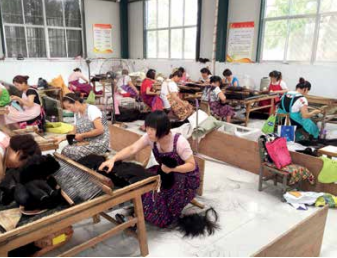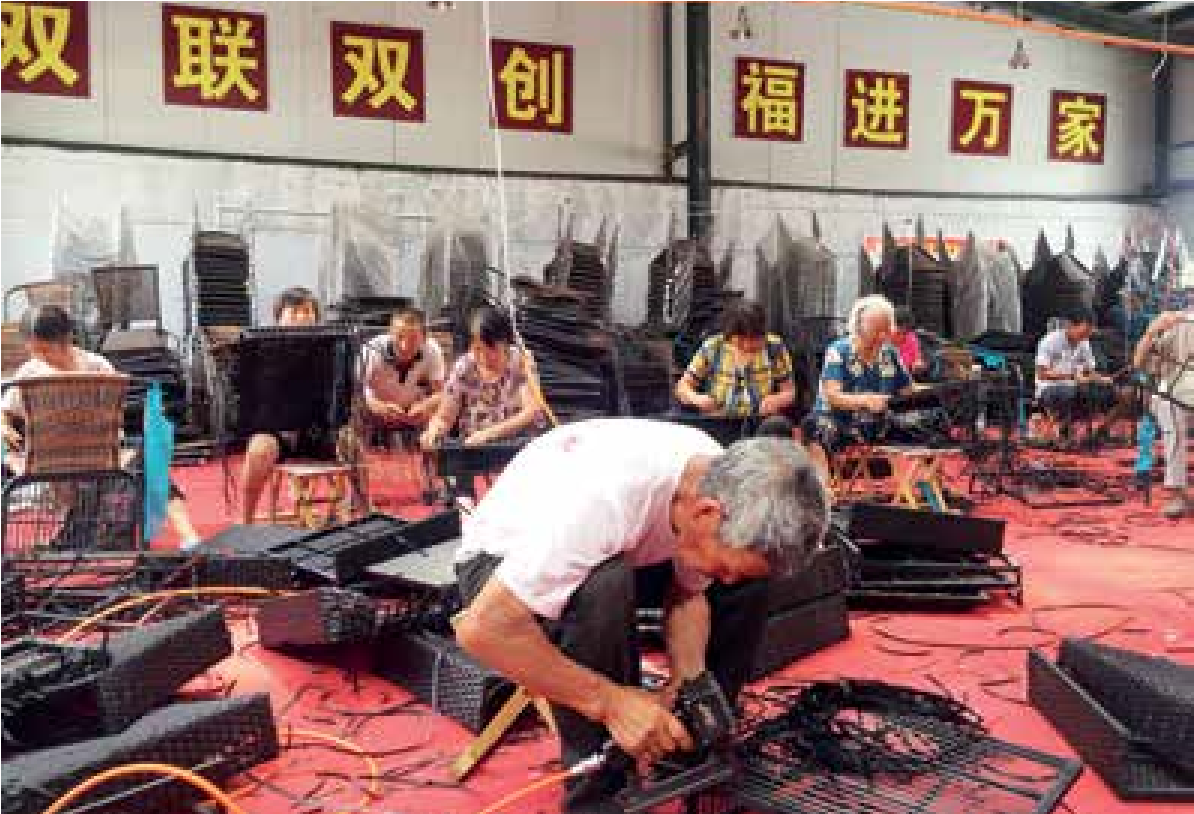Abstract: Many administrative areas engaging in poverty alleviation in China have adopted an approach in which they help their rural hamlets focus on making particular offerings available, such as produce and handicrafts, known as "one village, one product" (OVOP). Businesses and other organisations are established in order to commercialise local specialties, and entirely new undertakings are sometimes introduced, while the government provides guidance and incentivises the training and hiring of impoverished local residents. The endeavours generally have low technical requirements, which has made it possible for many rural low-wage labourers to find work in their local areas, especially women, the elderly, persons with disabilities, and people who are part of other vulnerable groups. Juancheng County in Heze City, Shandong Province, is one of the places where the strategy was implemented, which made it possible for places like Daitang Village of Dongkou Town to replace workshops located in dilapidated shacks with poverty reduction factories and for residents like Niu Suzhen to increase their incomes in recent years.
Key Figures
★ 429 poverty alleviation workshops established in Juancheng County
★ 17,000 people employed at the facilities
★ Average monthly earnings: over RMB1,300
Main Body

Employees produce wigs and other products made out of hair at a poverty reduction workshop in Xijie Village, Zhengying Town, Juancheng County, Heze City, Shandong Province.
In November 2015, a poverty alleviation work group based in Heze City, Shandong Province, discovered eight elderly women huddling around a coal dust ball stove in a shack made of wooden planks and metal sheets attached to an iron frame on the western side of a residents yard during a field inspection in Daitang Village, Dongkou Town, Juancheng County. The women were making RMB13 per person per day removing discoloured hair from wigs and were each paying RMB0.5 per day in rent to the owner of the approximately 10-sq. m structure. The work group found six other sites that were being used to process products made from human hair in the village, some of which were located in unused rooms in various buildings and some of which were in other shacks.
Businesses that produce products made out of hair thrive in Juancheng. Many of them were operating venues devoted to the pre-processing of products that are then completed at factories in other areas similar to the ones found in Daitang in rural parts of the county until several years ago, however. Most of them were small, lacked appropriate fire safety measures, and had poor working conditions in general, just as Daitang's did.
The work group thought that establishing poverty reduction-oriented workshops that provide jobs that are easy to learn would be a good way to improve working conditions and help people become more prosperous in Juancheng's villages.
A survey conducted in the county revealed that nearly 60,000 low-income residents of its 385 villages had the ability and desire to work but were not able to relocate to more-prosperous areas where their incomes would be higher due to factors such as their ages, education levels, disability or overall health statuses, and farm and family commitments. Labour-intensive companies that produce products such as hairpieces, furniture, garments, and electronic accessories based in the county's urban areas and locations outside the administrative area's borders also found it difficult to find enough employees.
Juancheng, therefore, encouraged 50 local government organs and 50 companies to help 103 impoverished villages transform disused school buildings, granaries, and other venues into poverty relief workshops and factories or establish new ones in order to help address these problems. The government provided RMB100 of subsidies per square meter, while the rest of the costs were covered by the organ or company providing assistance to a given village, and facilities covering around 300 sq. m of area were established in each of the villages. Working conditions are much better than they were at the shacks that used to exist – the workshops are equipped with fans, air conditioning, drinking fountains, radio service, fire extinguishers, and other health and safety features and equipment – and employees are provided with free uniforms.
Ownership of the workshops and factories belongs to the villages that they are located in, and the facilities can be leased out as collective properties. The rentals the villages receive from the companies that rent them are used to fund public services that local collectives provide. Juancheng has also organised training courses in order to help residents learn the skills that are necessary to do the jobs at the workshops and factories. Preferential treatment has been given to the organisations that hire poverty-stricken people from the region, such as reduced rent rates, water and electricity subsidies, and access to preferential loans that can be used to cover start-up costs, in order to encourage them to participate in the project.
By the end of 2020, a total of 429 poverty alleviation workshops and factories had been established in Juancheng's 385 villages, and their 12,000 total employees were earning an average of more than RMB1,300 a month. The spaces promote development and prosperity, and the government has helped 80 of them register as small and micro- enterprises. Juancheng's poverty reduction workshops and factories have continued to expand; they employed approximately 17,000 people as of 2021.

Employees make chairs and other rattan products at a poverty alleviation workshop in Changzhuang Village, Guquan Subdistrict, Juancheng County.
Brighter Horizons
Two workshops were established in Xijie Village, Zhengying Town – a small hamlet located approximately 20 km away from Daitang – in October 2016. The facilities employ a total of 134 people, a high percentage of whom had little to do during the summer months and more than 50 of whom had been found to be impoverished prior to working at them.
One of the workshops is a small facility that produces hairpieces and other products made out of hair. It employs about 20 elderly women, including a 75-year-old resident named Niu Suzhen. She works eight hours a day removing white and grey hair from wigs and other products at the site and lives just across the road, which is very convenient for her. She wears glasses, but her corrected eyesight is good, which makes it possible for her to spot individual white or grey hairs amidst thick tuffets and remove them.
"The workshops take care of us," Niu answered when asked about her experiences with Juancheng's poverty eradication factory programme. "The other seniors and I are paid at a fixed rate of RMB3 per hour, while younger people receive piece rate pay, since our hands are not as fast as theirs are."
The county's poverty alleviation workshops and factories produce a broad range of products. Flexible working systems have been implemented, which gives people with family responsibilities and other matters to attend to the ability to take care of their private affairs, and remuneration is supervised in order to ensure that employees receive their wages in full and on time.
The training and recruitment systems that have been established in Juancheng have benefitted the businesses that have gotten involved, including a large outdoor furniture manufacturing company that established a labour-intensive poverty reduction workshop to produces rattan products in the county and many others.
Regions that want to reduce poverty by creating job opportunities in rural areas may benefit from taking a look at Shandong's experience with poverty alleviation workshops and factories.
Category
Poverty Alleviation Workshops Provide Opportunities for Members of Vulnerable Groups in Shandong's Juancheng County
Contributor
Poverty Alleviation Workshops Provide Opportunities for Members of Vulnerable Groups in Shandong's Juancheng County
Country
Story

